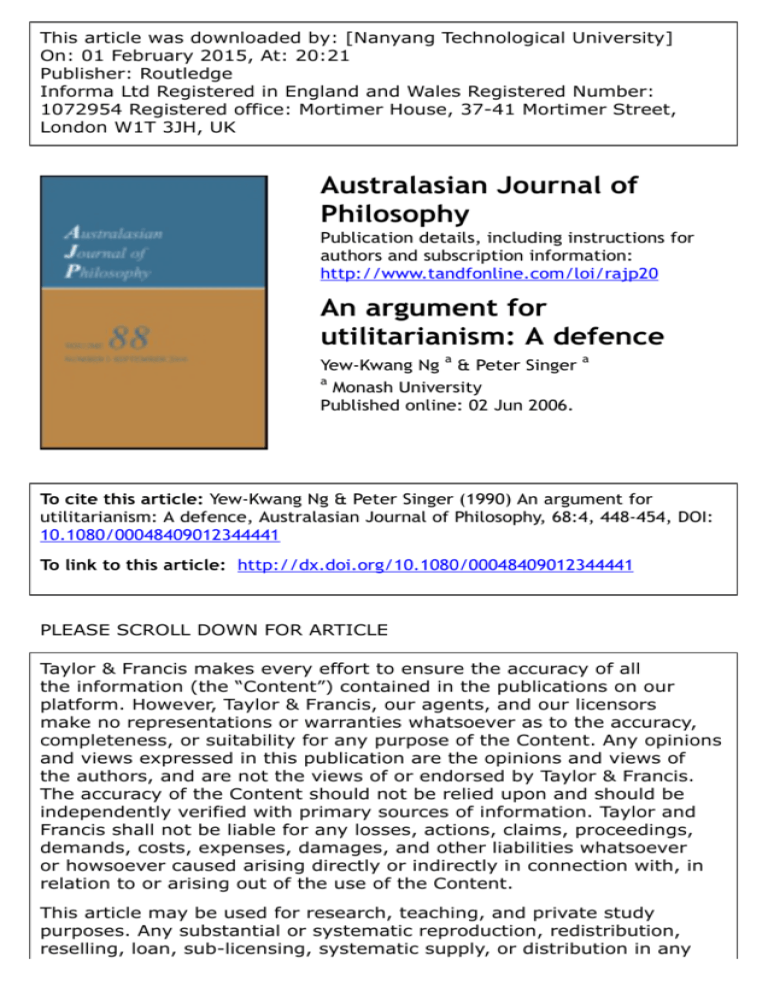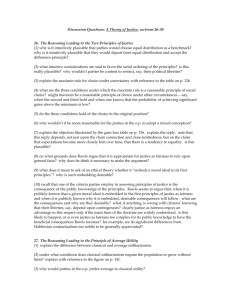A defence - Nanyang Technological University
advertisement

This article was downloaded by: [Nanyang Technological University] On: 01 February 2015, At: 20:21 Publisher: Routledge Informa Ltd Registered in England and Wales Registered Number: 1072954 Registered office: Mortimer House, 37-41 Mortimer Street, London W1T 3JH, UK Australasian Journal of Philosophy Publication details, including instructions for authors and subscription information: http://www.tandfonline.com/loi/rajp20 An argument for utilitarianism: A defence a Yew-Kwang Ng & Peter Singer a a Monash University Published online: 02 Jun 2006. To cite this article: Yew-Kwang Ng & Peter Singer (1990) An argument for utilitarianism: A defence, Australasian Journal of Philosophy, 68:4, 448-454, DOI: 10.1080/00048409012344441 To link to this article: http://dx.doi.org/10.1080/00048409012344441 PLEASE SCROLL DOWN FOR ARTICLE Taylor & Francis makes every effort to ensure the accuracy of all the information (the “Content”) contained in the publications on our platform. However, Taylor & Francis, our agents, and our licensors make no representations or warranties whatsoever as to the accuracy, completeness, or suitability for any purpose of the Content. Any opinions and views expressed in this publication are the opinions and views of the authors, and are not the views of or endorsed by Taylor & Francis. The accuracy of the Content should not be relied upon and should be independently verified with primary sources of information. Taylor and Francis shall not be liable for any losses, actions, claims, proceedings, demands, costs, expenses, damages, and other liabilities whatsoever or howsoever caused arising directly or indirectly in connection with, in relation to or arising out of the use of the Content. This article may be used for research, teaching, and private study purposes. Any substantial or systematic reproduction, redistribution, reselling, loan, sub-licensing, systematic supply, or distribution in any Downloaded by [Nanyang Technological University] at 20:21 01 February 2015 form to anyone is expressly forbidden. Terms & Conditions of access and use can be found at http://www.tandfonline.com/page/terms-andconditions Australasian Journal of Philosophy Vol. 68, No. 4: December 1990 AN ARGUMENT FOR UTILITARIANISM: A DEFENCE Downloaded by [Nanyang Technological University] at 20:21 01 February 2015 Yew-Kwang Ng and Peter Singer We advanced an argument for utilitarianism in Ng and Singer [9] based on a widely acceptable value premise called the Weak Majority Preference Principle (WMP; see below) and the fact of finite sensibility (that human beings are not infinitely discriminative). This argument was first commented on by David Gordon [3] to which we provided a defence, Ng and Singer [10]. Subsequently, it was further commented on by Jukka Kilpi [4] in this Journal. Unfortunately, one of us was completely unaware of this comment and the other was too preoccupied at the time. We feel that we should defend our argument against Kilpi's comment, especially since this concerns the acceptability of a major school of moral philosophy. Our argument may be briefly stated intuitively. (See our [9] for a more detailed discussion and Ng [6] for an axiomatic derivation.) WMP states: For a community of n individuals choosing between two possibilities, x and y, if no individual prefers y to x, and at least n/2 individuals prefer x to y, then x increases social welfare and is preferable. When combined with finite sensibility, we have a social improvement if half of the people become noticeably better off and the other half unnoticeably worse off. Conversely, as long as half of the people become noticeably worse off and the other half unnoticeably better off, the society is worse off. Taking the limit, social welfare stays unchanged (or the society is indifferent) as half of the population are made just unnoticeably better off and the Other half just unnoticeably worse off. Consider three alternatives x, y, and z illustrated in Figure 1. In comparison to x, y involves the first half of the individuals being just unnoticeably better off and the second half just unnoticeably worse off. In comparison to y, z involves half (the second half less the last individual but plus the first individual) just unnoticeably better off and the other half (the first half less the first individual but plus the last individual) just unnoticeably worse off. Hence, x should be socially indifferent to y which should be socially indifferent to z. Transitivity requires social indifference between x and z. Comparing z to x, all individuals have utility levels exactly unchanged except the first individual whose utility increases by two units and the. last individual whose utility decreases by two units. This result does not depend on the choice of these two particular individuals, since WMP applies to any half of the population. We may thus conclude that, irrespective of the initial situation, if the utility of any individual increases by two units and that of any other 448 Yew-Kwang Ng and Peter Singer 449 Individual Utilities Downloaded by [Nanyang Technological University] at 20:21 01 February 2015 D IP" s,,fJJ"~~ "" " y t* 7. Individuals Qeee x y z Figure I. individual decreases by two units, with the utility levels of all other individuals remaining unchanged, social welfare must remain unchanged. Effectively, this means that the utility of any one individual can be traded off against that of another, and the best state for the society is that in which the total utility (the unweighted sum of the individual utilities) is as high as possible. This is utilitarianism. Kilpi acknowledges the acceptability of both WMP and finite sensibility. His attempt to refute our argument consists in the rejection of transitivity of social indifference. Due to finite sensibility, it is obvious that individual indifferences are intransitive. One may be indifferent between 2 spoons of sugar (in one's coffee) and 1.9 spoons, and be indifferent between 1.9 and 1.8, but prefer 2 to 1.8. It is very tempting to argue, as Kilpi does, that the intransitivity of individual indifferences makes the assumption of the transitivity of social indifference unacceptable. Individuals have intransitive indifferences because of imperfect discriminative power or finite sensibility, not because of illogical preferences. If the society is also confronted with situations where perfect discrimination is impossible, intransitive indifference should be granted. However, the value premise WMP is accepted as a clearly sufficient condition for an exact (not approximate) social improvement. If at least 50% become noticeably better Downloaded by [Nanyang Technological University] at 20:21 01 February 2015 450 An Argumentfor Utilitarianism."A Defence off and no one noticeably worse off, this must be accepted as a clear and definite social improvement. Hence, the social indifferences of x to y and y to z derived from WMP are exact indifferences, not just approximate indifferences. Kilpi himself finds WMP 'a very weak (i.e. very acceptable) value principle indeed'. Thus, social preferences and indifferences derived from WMP must be accepted as transitive to be logically consistent. For this reason, we do not believe that Kilpi's attempt to refute our argument is successful. To see further the exact social indifference between x and y (and between y and z), consider y" where 50% (of the individuals) are made just noticeably better off and 50% just unnoticeably worse off in comparison to x. Obviously y' is strictly socially preferable to x. Recall that y involves making 50% just unnoticeably better off and 50% just unnoticeably worse off than x. So y' and y may differ only by an epsilon (i.e. infinitesimally small) amount in terms of the underlying preferences or welfares of the individuals. Similarly, if y" involves making 50% just unnoticeably better off and 50% just noticeably worse off in comparison to x, y" is definitely socially inferior to x. But y" differs from y also only by an epsilon amount. Thus, from y, as we add an epsilon, we obtain y' which is definitely better than x; as we subtract an epsilon, we obtain y" which is definitely worse than x. So y must itself be exactly socially indifferent to x. The same argument applies to y and z. So z is also socially indifferent to x from the transitivity of exact social indifference. Kilpi also questions the ethical relevance of our framework 'because the choice situation it describes is given in terms that are alien to real life. Nothing would prevent actual individuals from directly comparing x to z, and those losing in z from preferring x' (p. 219). This argument appears to miss the point of conceptual arguments and hypothetical examples. Anyone who accepts our premises and the validity of our derivation must logically accept our conclusion. Those who lose out in z may personally prefer x to z. However, this in no way affects the social indifference between x and z based on our argument. It is true that WMP itself cannot be used directly to make social comparisons involving someone noticeably worse off and some other noticeably better off, as emphasized by Kilpi (p. 217). However, he seems to be unaware that, once we have derived the principle of utilitarianism from WMP and finite sensibility, we can then use utilitarianism to make all comparisons (where of course individual utilities are known). This is where the power of our original argument lies: deriving something very strong from very weak premises! It may make the basis of our position clearer if we consider the following objection~ Assume that there are two persons with equal capacity for feeling in the sense that the range between the two extreme levels of well-being--for the sake of convenience we may call these bliss and abject misery--is the same for both persons. But assume that one of the persons has a Yew-Kwang Ng and PeterSinger 451 Downloaded by [Nanyang Technological University] at 20:21 01 February 2015 fine sense of discrimination so that she has a large number of discretion levels between bliss and abject misery whereas the other person has only a few discretion levels between these two extremes. In this case to declare that the social significance of a movement from one discretion level to another is the same for both individuals will be regarded by many as being unfair to the person with fewer discretion levels (Pattanaik [11, 150]). To this we reply, as one of us has argued elsewhere: 'If it is true that the second person has much fewer levels of discretion between bliss and misery than the first person, it seems contradictory to assume that the range between the two extremes is the same for both persons' (Ng [6]). Our reply takes just noticeable differences in utility as standard units by which interpersonal comparisons of utility can be made. One of us has argued for this elsewhere (Ng[7]). But there are some complications that need to be made explicit. First, an individual may be able to observe a very small difference in, say, the degree of greyness of a roadside pole. However, if he does not really feel better or worse off in changing the colour, his many levels of discrimination should not count. We must keep in mind the fact that the individual 'preference' mentioned in WMP refers to actual subjective preference or well being, and not to the mere discrimination of differences of some objective dimensions. It is this that makes plausible our assumption that just noticeable differences in utility can serve as an interpersonal standard unit. Secondly, it may be argued that a just perceptible improvement may differ across different experiences even for the same individual. 'On many occasions, a just perceptible improvement in musical performance means much more to me than a just perceptible quantity of drink' (Mirrlees [5, 69]). This may be due to the difference in time period involved and/or to possible future effects. A just perceptible quantity of drink may last only a fraction of a second, while the musical performance probably a couple of hours. Moreover, Mirrlees may also value the recollection of a high-quality musical performance. As it is, WMP is formulated in an atemporal basis and hence does not cover the complication introduced by differences in time period. With time as a dimension, one should then select a just perceptible improvement over a just perceptible length with neither future nor external effect as the standard unit, and use indirect measurement (Ng [6, section 9]) for experiences which are difficult to measure in this way. Thirdly, different individuals may differ in their degree of assertiveness. Some may decline to assert that there is a difference until it is very clear and substantial. Such differences may create difficulties in the actual measurement of individual utilities but does not create a problem at the level of general principles we are currently dealing with. Something along the following line has also been argued. For ten equally thirsty persons, transferring a drop of water from nine persons to the tenth makes them only imperceptibly worse off, but one person perceptibly better Downloaded by [Nanyang Technological University] at 20:21 01 February 2015 452 An Argument for Utilitarianism:A Defence off. If we keep doing this, we may end up giving all the ten glasses of water to a single person. However, it is clear that WMP would not sanction any step of such changes. WMP requires at least 50% to be made perceptibly better off, not just one out of ten persons. Arrow ([1, 116-118]) also argues against the principle of maximising the number of just perceptible welfare differences by showing that a small difference in sensibility between individuals will lead to complete inequality in income distribution. This demonstration is based on the assumption that the income differential giving rise to a discrimination level is independent of the level of income. One would expect that, as income is reduced, an individual will be more sensitive to a given change in his income level (a higher marginal utility of income at a lower income level). Arrow acknowledges that 'it would not be difficult to construct examples . . . for which . . . increasing ability to discriminate at lower levels of income is sufficient to prevent complete inequality' (p. 118n). However, he sustains his objection by saying that a moderate difference in sensibility may still lead to a very great inequality of income, even taking account of the diminishing marginal utility of income. Apart from incentive effects, we doubt that the differences in sensibility will lead to much inequality of income if we apply utilitarianism in practice. Psychological studies of pain sensation show that pain thresholds are very close for different individuals (e.g. averaging 230 + 10 standard variation), as are the number of just noticeable differences. (See Hardy [2, 88, 157]) If there are more differences in the capacity to enjoy income, these are probably due to 'learning by doing', and a long-run analysis will take account of that. If some inequality still persists after taking all effects (including people's aversion to inequality) into account, we cannot see why this is not an optimal distribution if it maximizes aggregate utility. Many people wish to give more weight to the preferences of the poor than those of the rich. If we change the word 'preferences' into 'incomes', we could not agree more. But giving different weights to preferences means that we are prepared to have a majority of strict preferences overruled by a minority of indifferences. We do not think that this is ethically acceptable. If we ask ourselves why we wish to give greater weight to the preferences of the poor, we may have a number of answers. The most obvious one is that incomes of the poor meet more urgent needs. But this is taken care of by reckoning in terms of utilities instead of incomes. Secondly, it may be said that the consumption of the rich is self-defeating due, e.g., to the snob effects, the desire to keep up with the Joneses, etc., while the consumption of the poor (e.g. if spent on education and health) may have very beneficial long-run effects. This again is taken care of in our analysis where all forms of indirect and external effects can be allowed. The only logical (but not necessarily acceptable) argument we can think of for not accepting utilitarianism is the following. According to a utilitarian social welfare function, the less sensitive person may end up with lower total utility. If we place some ultimate value on equality as such (not due Downloaded by [Nanyang Technological University] at 20:21 01 February 2015 Yew-KwangNg and PeterSinger 453 to the undesirable effect of inequality on social harmony, etc.), we may be prepared to accept a larger decrement of utility by the well-off for the sake of a smaller increment in utility to the not-so-well-off. This is apparently a very persuasive argument. What is not generally recognized is that it implies the rejection of WMP. 1 To show that the persuasiveness of the abovementioned argument is more apparent than real, let us look at the problem from a different angle. Abstracting from the issues of incentives, externality, etc., let us start from a position of complete equality in income distribution. If A is less sensitive than B, transferring $x from A to B will not make A any worse off in actual experience of feeling but will make B better off. Why shouldn't A agree that it be so transferred? Many people tend to emphasise (perhaps correctly) the need for the well-off to have more regard for the worse-off, while incorrectly neglecting the need for the worseoff to have some regard for the well-off. This is partly why we find the Rawlsian Maximin Principle of social justice ethically unacceptable. It has some persuasiveness looking from the viewpoint of the well-off since it appeals to the altruistic motive (perhaps partly explained by guilt feelings of the well-off). This might partly explain the overwhelming attention to Rawls in the last couple of decades. If we view it from the point of the worse-off and especially the worst-off, the Maximin Principle becomes very objectionable. First, why should society pay sole attention to the worst-off, to the exclusion of the rest of the badly-off? Secondly, if one puts oneself in the position of the worst-off, one will be, we believe, compelled to say that one would not like the society to sacrifice enormous amounts of other people's welfare for a small improvement in one's own well-being. This seems to put advocates of the Rawlsian Principle into a dilemma. If people are required to sacrifice enormously for the small benefit of the worst-off, a similar (not exactly the same) ethic seems to require that the worst-off should not accept such a sacrifice. 2 Consider the much-cherished principle, 'From each according to ability; to each according to needs' (which we personally accept, assuming no disincentive effect). Why doesn't it read, 'An equal amount of work from each; an equal amount of income to each'? If a weak person is tired by four hours of work, it is better for a stronger person to work longer to relieve the weaker. Similarly, if a less sensitive person does not much enjoy i We have shown above that WMP implies exact social indifference between x and y where y (in comparison to x) involves 50% becoming just unnoticeably better off and 50% just unnoticeably worse off. If we place some ultimate value on equality of utility, then we will prefer y to x if the 50% who become unnoticeably better off happen to be the less well-off and the 50% who become unnoticeably worse off happen to be the more welloff. But this violates the requirement of WMP. 2 It is true that Rawls attempts to justify his maximin criterion by hypothesizing a voluntary contractual arrangement at a preconstitutional stage. In the 'original position', no one knows who will be the worst-off. At this pre-constitutional level, it seems to us irrational to accept the maximin principle. Moreover, we should think that one will agree that, whoever is the worst-off at the post-constitutional stage should not tolerate enormous sacrificeby others for a small personal welfare gain. 454 An Argument for Utilitarianism." A Defence extra purchasing power, it is better that the more sensitive person receive more o f it. It is our utility illusion (on which see Ng [6]) plus perhaps a guilty conscience that prevents us from seeing such a simple analogy. Monash University Received April 1989 Downloaded by [Nanyang Technological University] at 20:21 01 February 2015 Rerences 1. Kenneth J. Arrow, Social Choice and Individual Values, New York: Wiley, 1951, 1963. 2. J. D. Hardy, et al., Pain Sensations and Reactions, Baltimore: Williams and Wilkins, 1952. 3. David Gordon, 'Ng and Singer on Utilitarianism', Canadian Journal of Philosophy XIII (1983) pp. 239-240. 4. Jukka Kilpi, 'A Refutation of an Argument for Utilitarianism', Australasian Journal of Philosophy 64 (1986) pp. 217-219. 5. James A. Mirrlees, 'The Economic Uses of Utilitarianism', in A. Sen and B. Williams (eds.), Utilitarianism and Beyond, Cambridge: Cambridge University Press, 1982. 6. Yew-Kwang Ng, 'Bentham or Bergson? Finite Sensibility, Utility Functions and Social Welfare Functions', The Review of Economic Studies 42 (1975) pp. 545-570. 7. Yew-Kwang Ng, 'Expected Subjective Utility: Is the Neumann Morgenstern Utility the Same as the Neoclasssical's?', Social Choice and Welfare 1 (1984) pp. 177-186. 8. Yew-Kwang Ng, 'Some Fundamental Issues in Social Welfare', in G. Feiwell (ed.), Issues in Contemporary Microeconomics and Welfare, London: Macmillan, 1985. 9. Yew-Kwang Ng and Peter Singer, 'An Argument for Utilitarianism', Canadian Journal of Philosophy XI (1981) pp. 229-239. 10. Yew-Kwang Ng and Peter Singer, 'Ng and Singer on Utilitarianism: A Reply', Canadian Journal of Philosophy XIII (1983) pp. 241-242. 11. Prasanta K. Pattanaik, Voting and Collective Choice, Cambridge: Cambridge University Press, 1971.






